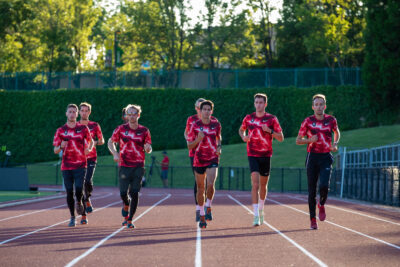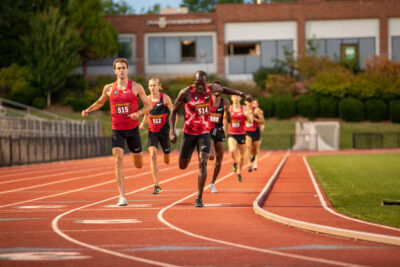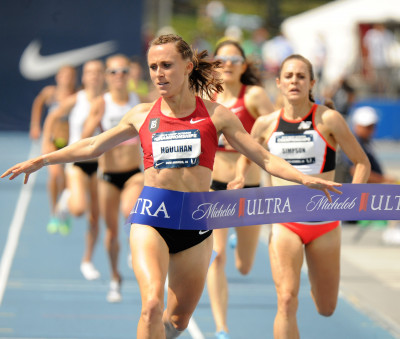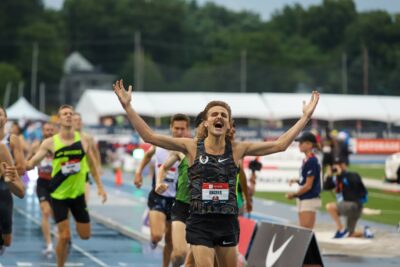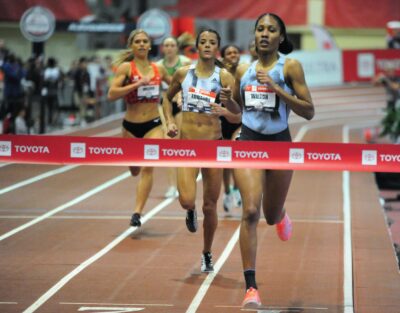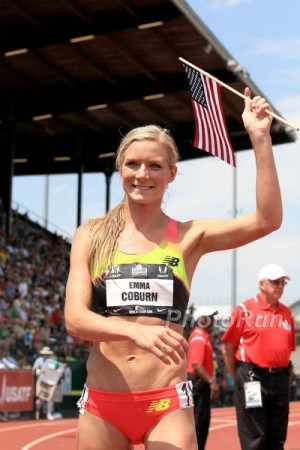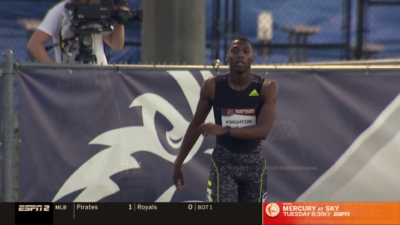Should We Be Worried About Bowerman TC, Which Americans Are Locks for Tokyo, and More HS Sprint Madness
By Jonathan Gault
June 2, 2021
Last weekend was the busiest of the spring in terms of the professional racing calendar and offered the last chance to see many American stars before the Olympic Trials begin 16 days from now in Eugene. With results flying in from Doha to Portland — and high schooler Hobbs Kessler‘s 3:34 1500 overshadowing everything else at the Portland Track Festival — it was a little tough to keep track of all of them. Did you realize there was a nationally-televised track meet on ESPN2 on Monday night? Or that Noah Lyles raced a 100m on Sunday night and narrowly beat a high schooler who ran 10.09? There’s a lot to unpack. Here’s what I’m thinking about after a wild weekend of racing.
Should we be worried about the Bowerman Track Club?
Most of the Bowerman Track Club squad competed over the weekend at the Portland Track Festival, and while BTC athletes posted some big wins, a few results (or lack thereof) could be cause for concern. Let’s break down some of the key BTC results from the weekend by category.
The Great
Elise Cranny, 1500 (1st, 4:02.62): Cranny looked fantastic in running a 3+ sec pb to win the 1500 and now has serious options heading into the Olympic Trials. A miler in college, Cranny now has the Olympic standard in the 1500 to go with the 5k (14:48.02) and 10k (30:47.42) standards she already owned. Running the longer events at the Trials may give her a better shot at the team (and allow her to double), but her run on Saturday showed she could be a contender in the 1500 as well.
Gabriela DeBues-Stafford, 800 (1st, 1:58.70): A huge run for the Canadian miler, who smashed through the 2:00 barrier and beat a field of 800 specialists.
The Good
Grant Fisher, 5000 (1st, B heat, 13:19.52): It’s hard to know what to make of this result as it came in the B heat and Fisher’s teammate Woody Kincaid didn’t seem to have much interest in racing him over the final two laps, moving aside to let Fisher take the lead. Any way you slice it, Fisher’s 1:56 last 800 was very impressive, the latest in a string of great results for the Stanford product.
Matthew Centrowitz, 800 (5th, 1:46.23): As recently as three weeks ago, there were questions about the 31-year-old Centrowitz, but he has put them to bed with his last two races. First a commanding 3:35 victory at the Track Meet, and now an even-split 1:46.23 800 (53.08-53.15), his fastest two-lapper since 2015. The reigning Trials champ looks to be coming around right on schedule.
The Concerning
Karissa Schweizer, 5000 (4th, 15:00.44): If she runs like she did on Saturday, Schweizer, the second-fastest American in history (14:26), would have trouble making the Canadian Olympic team at 5000, let alone the American one. Running her first race since February, Schweizer found herself in a close race at the bell but got her doors blown off by race winner Jessica Hull (14:57.00) and Canadians Andrea Seccafien (14:57.07) and Julie-Anne Staehli (14:57.50) as Schweizer could only manage a 66.85 final lap.
Lopez Lomong, 5000 (1st, 13:26.11): Yes, Lomong won his race. And yes it was his first race since last August. But, Lomong did not look comfortable on the last lap, having to battle in the final straight to hold off the unheralded David Ribich (who, to be fair, ran an impressive 11-second pb). You also have to wonder why coach Jerry Schumacher kept Lomong separated from Fisher and Woody Kincaid in the B heat. Was it just to ease Lomong back into racing? Or did he know Fisher was in much better shape right now and wanted to keep Lomong’s confidence high heading into the Trials?
Sean McGorty, steeple (3rd, 8:22.75): Okay, it’s a little unfair to McGorty to label this race “concerning.” He deservedly earned rave reviews for his 8:20 debut at Mt. SAC on May 15, so it’s not a disaster to run two seconds slower in just his second-ever steeple. That said, this result was a blow to his Olympic chances in the event as he was beaten convincingly by two guys he’ll have to contend with in Eugene: Mason Ferlic (8:18.79) and Benard Keter (a six-second pb of 8:20.40). On the plus side, he got some experience steepling with people around him.
Sinclaire Johnson, 1500 (10th, 4:06.49): Johnson was in good form earlier this year, but her last two races have been rough, finishing 14th in the Track Meet and 10th in Portland. The quality of the field she faced in Portland is roughly on par with what she will face in an Olympic Trials semifinal; thus it’s alarming that she was so far behind athletes like Cranny and Dani Jones (4:04.26).
The Question Marks
Shelby Houlihan, 1500 (DNS): Houlihan, who has been dealing with a nagging plantar injury, was slated to make her 2021 debut in the 1500 on Saturday but wound up scratching. Instead, she ran a time trial on Friday and clocked the fastest time by an American this year: 3:57. It’s puzzling that Houlihan has not still raced in 2021. If you’re fit enough to run 3:57 in a time trial, why not do it in an actual race? She’ll have to run three races in four days if she is to make the 1500 team in Eugene.
Evan Jager, steeple (DNS): Jager was initially entered in the steeple in Portland, where he intended to knock out the 8:22.00 Olympic standard, but also wound up withdrawing prior to the meet. Jager’s withdrawal is far more concerning than Houlihan, who already has the Olympic standard and is very fit right now. Jager needs the standard, and unless he plans on squeezing in a steeple in the next two weeks, he’ll have to get it at the Trials. If he’s fit enough to make the team, Jager should be able to do that. But it’s not a good sign that Jager, who hasn’t finished a steeple since 2018 and has battled an Achilles injury recently, is scratching from a race just three weeks out from the Trials.
***
Bowerman head coach Jerry Schumacher has made some interesting decisions in the leadup to this year’s Trials. Sticking Grant Fisher in the B heat? Not racing the best women’s distance runner in the country at all in the leadup to the Olympic Trials? I can’t pretend to explain to you why Schumacher does the things he does.
What I do know is that the guy is one of the greatest coaches in the world and has proven over the years that he knows what he is doing. Which is why, if you’re a BTC fan looking for a silver lining to last week’s results, it is this: no one tries to peak for the Portland Track Festival. Most BTC athletes have been holed up in Park City for the last month. Perhaps some of the athletes who posted disappointing results over the weekend were in the midst of an intense training block and will be ready to go for the Trials.
One final comment: is it too much to ask for an explanation when two of the country’s best and most popular runners (Houlihan and Jager) withdraw from a race in their home city? If the Chiefs decided to play a game without Patrick Mahomes, you better believe they’d give an explanation as to why he wasn’t in the lineup. Yet Houlihan and Jager scratch from a meet where both are scheduled to race their specialty event for the first time this year, and there’s no acknowledgment anywhere (LRC reached out to Houlihan and Jager for comment and did not receive a response).
There currently is a debate as to whether sport stars owe anything to the media/fans other than competing. The leagues that are super successful and popular basically require it.
That Other Nike Team
Pete Julian‘s team also raced in Portland over the weekend and produced a number of noteworthy results. Running in his first outdoor 800 of the year, Donavan Brazier looked more vulnerable than usual, as he had to dig hard to hold off emerging Mexican talent Tonatiu Lopez, 1:45.09 to 1:45.14. We’re used to seeing Brazier power away from fields over the final 100 meters, but he wasn’t able to do that on Saturday night and seemed surprised to have company in the home straight. That being said, he did handily defeat 1:42.05 man Emmanuel Korir.
Hobbs Kessler stole the show in the 1500, but the result more likely to impact the Olympic Trials was Craig Engels‘ 3:33.62, a personal best and first victory at 1500m since Engels’ US title in 2019. After the race, Engels was brutally honest about his form this year, but his win on Saturday — and the manner in which he did it, staying patient and working himself free after finding himself boxed in late — was a huge step forward. Engels’ time was the fastest by an American this year and puts him in a great position heading into the Trials.
“I’ve been running like trash,” Engels told Ken Goe of The Oregonian. “I came back to Portland and regrouped and tried to refire myself up for the sport. For the last year and a half, I don’t really know what my motivation has been. Now my motivation is making the Olympic team for my family and myself.”
While it was a successful weekend overall for Julian’s athletes (there were also wins for Suguru Osako in the 10k and Jessica Hull in the 5k), one athlete did not fare as well: reigning World Championship silver medalist Raevyn Rogers. Rogers was just 6th in the 800 in 1:59.72, losing to fellow Americans Sabrina Southerland, Kate Grace, Chanelle Price, and Cory McGee. Rogers had rebounded from poor races to make the team before — she failed to break 2:00 in four of her last five races before USAs in 2019 — but the fact is that she has not been running well in 2021 and will need to up her game in Eugene. The US women’s 800 squad is one of the hardest teams to make — any country, any event.
Rogers’ recent struggles brings us to our next topic…
How many Americans are “locks” for the Olympic team right now?
With a number of top Americans looking vulnerable in Portland on Saturday night, I couldn’t help but think about how much uncertainty there is going into the Olympic Trials. This close to a US championship, I usually have a pretty good idea of who is going to make the team, but it doesn’t feel that way in 2021. So I decided to go through every distance event and try to determine what I am certain of right now — the athletes who are locks to make the Olympic team in each event.
Men’s 800
Locks: Donavan Brazier, Bryce Hoppel
After Brazier’s unconvincing victory on Saturday, I debated this one with LRC co-founders Robert and Weldon Johnson, neither of whom viewed Brazier as a total 100% lock, particularly given what happened in 2016. Maybe I’m overly confident — Brazier has been a little banged up this spring and anything can happen in the 800 — but it seems inconceivable that the reigning world champ and American record holder, who hasn’t lost an 800 in over two years, will not finish in the top 3 in Eugene. Hoppel has not put a foot wrong since the start of 2019 — remember, he ran 1:43.23 and almost beat Brazier last summer — and I feel very confident that he makes the team as well.
Women’s 800
Locks: Ajee’ Wilson
I’m actually a little worried about Wilson…does it concern anyone else that she has raced just once since April 10, and when she did, she was beaten in a road 600 by Natoya Goule? But she’s so damn consistent (seven straight US titles between indoors and out) and has been the best non-DSD 800 runner in the world for the last four years. I just don’t see three Americans beating her at the Trials.
Athing Mu, the 2021 world leader at 1:57.73, obviously earned consideration. But she’s also been beating up on college kids all year, which is very different from making it through three pressure-packed championship rounds. As special as Mu is, I don’t feel comfortable making a teenager (she turns 19 next week) a lock.
This is also a reflection of how competitive the women’s 800 is now. Sabrina Southerland just ran 1:58.82, Kate Grace is running the best she has in years, Chanelle Price just ran 1:59.12, Raevyn Rogers hasn’t been in form but is still dangerous. There are a lot of quality women vying for those Olympic spots.
Men’s 1500
Lock: Matthew Centrowitz
There’s been no safer bet in track & field over the last decade than Matthew Centrowitz making the US 1500 team; he’s made all seven since 2011, finishing first or second at USAs every time out. If Centro is fit, he makes the team, and his recent results show he’s definitely fit.
After him, there are no certainties. Engels looked great over the weekend but hadn’t been running well until that point. Yared Nuguse and Cole Hocker are amazing, but I wouldn’t take either over Centro & Engels. That means they’re battling each other (and the rest of America) for the third spot; neither has separated enough to earn lock status.
Women’s 1500
Locks: Shelby Houlihan, Elle Purrier
Call me crazy for awarding lock status to a woman who hasn’t raced yet in 2021. But when you’ve run over a second faster than any American in history and just ran 3:57 in a time trial, you’re a lock for the 1500 team. Purrier has been terrific the past two years and is clearly a cut above every other American not named Houlihan.
Men’s steeple
Locks: None
Evan Jager is usually a lock, but he hasn’t raced a steeple since 2018. There’s not enough clarity about his health situation to declare him a lock. Outside of Jager, there are a number of contenders but no one has separated themselves from the pack. This should be one of the most entertaining races of the Trials.
Hillary Bor has run 8:09 and just won a DL race, but he also lost to two Americans in his race before that.
Women’s steeple
Locks: Emma Coburn, Courtney Frerichs
Coburn just opened up her season in Doha by running a time (9:08) only one other American has ever run, so I feel confident about putting her on the team. Frerichs has yet to break 9:20 in either of her steeples this year, which might be alarming given her pb is 9:00. But while a 9:21 — her time at the Portland Track Festival — is unimpressive for Frerichs, it’s still way better than all but a handful of Americans have ever run. She’s capable of a good deal faster at the Trials, which will be enough to clinch a spot on the team.
Apologies to Colleen Quigley, who has traditionally made teams after injury-hampered buildups, but if you haven’t raced a steeple since July 2019 — and haven’t raced, period, since February 6 — I can’t call you a lock.
Men’s & Women’s 5,000/10,000
Locks: None
These events are all roughly the same: a bunch of athletes have the Olympic standard in each event, and the top contenders haven’t raced each other enough to develop a clear pecking order. Then there’s a question of who runs which event. If I knew definitively that Elise Cranny was running either the 5k or the 10k, she would be pretty close to a lock for me. I’d be quite surprised if Grant Fisher didn’t make the Olympics, particularly in the 5k, but what if he runs the 10k and it goes badly (it’s only his second 10k ever) it destroys him? Of course, Emily Sisson is a very good bet for the 10k, but Cranny and Schweizer are the third- and fourth-fastest Americans in history, and I don’t think it’s unreasonable that someone like Emily Infeld or Rachel Schneider could swoop in and steal the third spot.
***
High School Sprint Madness in Florida
A month ago, I wrote about 17-year-old high school phenoms Jaylen Slade and Erriyon Knighton and how both could be major factors at the Olympic Trials, a la Noah Lyles and Michael Norman in 2016. Last weekend’s meets churned up more evidence to support that point, as both men put a scare into famous high school records.
Slade was up first, at the Pure Summer Invitational in Clermont on Sunday night. Due to a series of unlucky wind readings, Slade’s 100 pb heading into the weekend was still just 10.47 — totally out of whack for a guy who ran a wind-legal 20.20 last month. In Clermont, the wind finally cooperated, and Slade ran 10.22 in the prelims before ripping a 10.09 in the final to set a junior class record and move into a tie for #3 on the all-time high school list, .09 off Trentavis Friday‘s national record.
Not to be outdone, one day later Knighton, running at the Duval County Challenge in Jacksonville, ran down Trayvon Bromell off the turn in the 200 to win in 20.11 — also a junior class record and #2 in high school history, behind only Noah Lyles‘ 20.09 national record. Perhaps most impressively, Knighton’s time also bettered Usain Bolt‘s world U18 best of 20.13 from 2003.
The winner of the 100 in Clermont was Isiah Young, who ran a pb of 9.89 to win over Lyles, who clocked 10.05 for second. Two things about that result stand out. First, Young, who trains with Dennis Mitchell and Justin Gatlin‘s group, is now a serious contender to make the US team in the 100. Young has never made a US team in the 100 (he was 4th at USAs in 2015) but, at 31, he is running faster than ever — his time of 9.89 puts him just .01 behind Bromell for the world lead.
Second, Lyles has now run seven 100m races in 2021 (including prelims) and has still yet to run under 10 seconds or win a final; Sunday’s race was the second time in eight days he had been smoked by Young, who also beat him, 9.94 to 10.10, at the adidas Boost Boston Games on May 23. We know Lyles, who has run 9.86 and won the Diamond League title in 2019, can excel in the 100, but he doesn’t have much time if he is to turn things around and preserve his dreams of 100/200 double gold in Tokyo.

